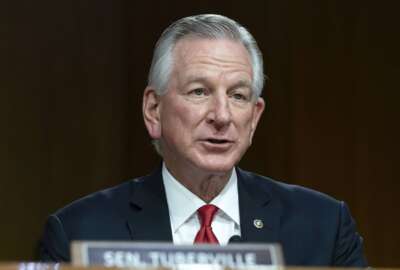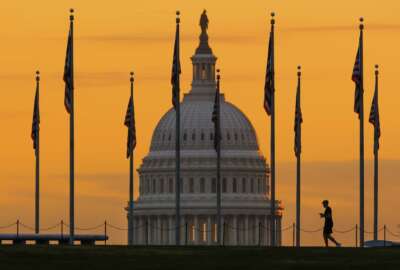Congress recesses with its federal budget still under construction
The House and Senate have a lot more to do for any chance of a budget by September 30. For one thing, the two chambers are $100 billion apart. This as they head out...
They haven’t done nothing, but the House and Senate have a lot more to do for any chance of a budget by September 30. For one thing, the two chambers are $100 billion apart. This as they head out for a long August recess. For an outlook, Federal Drive Host Tom Temin spoke with Bloomberg Government Congress Reporter Jack Fitzpatrick.
Interview Transcript:
Tom Temin Rundown, you’ve done pretty extensive reporting on the budget as it stands right now, as they do go home and face the heat and one in more than one way, I suppose. What are things look like right now?
Jack Fitzpatrick Things do not look great if you want them to actually fund the government and have a full deal by September 30th. Does that mean there’s a huge risk of a shutdown or are we talking about a long stopgap measure? It’s a little hard to predict right now. There are some conservatives who are kind of itching for a shutdown. Bob Good from Virginia said a few days ago. You know, a lot of people wouldn’t even miss anything we do here if we shut the government down. We shouldn’t be afraid of that as leverage. That’s not exactly the Republican leadership line. But there’s a big gap between the House and Senate, and it’s actually growing. They had the bipartisan debt limit deal that set some spending levels. You’ve got House conservatives who want to go well under it. Senators in both parties want to go over it and use emergency spending and cap exempt funds to spend more than what was outlined in that deal. So right now, there’s about $100 billion gap and possibly growing between the two chambers is it’s going to be tough to actually strike a deal by September 30th.
Tom Temin Right. And they don’t come back till Labor Day now. Correct.
Jack Fitzpatrick After Labor Day, the Senate comes back on the 5th of September. The House doesn’t actually come back until the 12th. So that makes it very, very difficult to hold very many floor votes. And they’ve just gotten started on that. The House voted on one of the 12 appropriations bills and passed it. They had attempted to get to a second, but there was there were some disagreements on that, highlighting how difficult it is to do any of this. The Senate has not taken any floor votes yet, but they have bipartisan support in committee. So that’s that’s not a lot of legislative days in September for them to do this. Steve Scalise did say they can talk between the House and Senate over the August recess, but before they have very many floor votes on their own bills, there’s not a lot of progress to be made.
Tom Temin Yeah, that’s kind of discouraging in a way, because when you look at say, contrast that with the National Defense Authorization Act, which is a lot of policy, that’s nowhere near reconciliation, because the Senate version, you know, specifically leaves out things that the House version has with respect to paying service members to go get abortions or covering their transportation costs, this kind of thing. But in the appropriations bills, I mean, it’s all dollars. And usually they can come closer on that one.
Jack Fitzpatrick You would think there are a lot of policy rider fights, especially in the House, in the appropriations bills. One of the reasons that they tried but failed to bring up the funding bill for agriculture and the FDA in the House was not only the funding levels, but a rider to block the availability of mifepristone, which is used as part of the abortion pill process. So even in the government funding debate it, you might think it’s all dollars. That is more the case in the Senate. But in the House, the abortion politics issues have really gotten themselves in there, some immigration issues. There’s a variety of policy debates that a lot of the conservative members in the House want to have through those government funding bills, because that’s a must pass bill.
Tom Temin And by the way, are there any authorizations up? Remind us of what needs to be done there, which is has some relation to keeping the government going asides from the NDAA.
Jack Fitzpatrick Yes. So the NDAA is a big one. The FAA is another one. There are a variety of authorizations that end September 30th that will probably get packaged together in a lot of the time. They do this in one large bill. If it’s a continuing resolution to fund the government on September 30th, they’ll do the National Flood Insurance Program extension, the farm bill extension. They’re not there really hasn’t even been that much of a conversation about actually getting to the final stages of the farm bill. That’s probably more next year. So there will probably be a large legislative package of extending any authorizations that they don’t finish on September 30th. And there will be a lot of actual debates to be had on those bills in the December or even early next year.
Tom Temin We’re speaking with Jack Fitzpatrick, Congress reporter for Bloomberg Government. A sticky issue that’s been going on and on is this hold on military flag officer promotions that has been placed by Senator Tuberville. There was even a rumor last week that it had been all taken care of and everyone was confirmed by unanimous consent. Don’t know how that got out, but what is the prospect for all of that?
Jack Fitzpatrick I think a sticky issue is the correct way to describe it. There have been floor speeches by other senators, very angry with them on the Democratic side, certainly right now. You know, they got through the whole defense authorization process without resolving his hold on those promotions. So there’s there’s not a very clear outlook and there isn’t really much of an end in sight. It’s more a matter at this point, it seems, still of political pressure and seeing if he if Democrats can get him to change his mind or not. But it is one of the stickier issues on Capitol Hill right now.
Tom Temin And there are some other executive openings, the Federal Communications Commission chair. I don’t think that vote ever happened, that confirmation vote. And then the FAA, we mentioned, needs to be reauthorized, but it also needs a permanent head.
Jack Fitzpatrick Yes, that that adds a lot to a to do list for the Senate. Again, as I mentioned, without a ton of legislative days coming back in September, they come back September 5th with a lot to do. As I mentioned, they also want to use that floor time to vote on these appropriations bills that they’ve marked up but have not had floor votes on. So there is going to need to be a real rush of, I guess, a lot of pressure on Senate floor time to see how many confirmation votes they can have, what authorizations can be quickly and easily packaged together. And it does matter if they decide they actually want to vote on individual appropriations bills or if they do a couple large packages, because there’s only so much time in September to have that many floor votes, especially in the slow moving Senate.
Tom Temin And on the human side of the Senate, we have known for some time that there is an elderly senator on the Democratic side, Dianne Feinstein, which is a tough thing to watch, given the illustrious history that she’s had in her life and what she’s done in California and in the Senate. And now Mitch McConnell looking increasingly frail on the Republican side. Is there I mean, do you get the sense the sides are saying to one another, well, we’ll move ours on if you move yours on?
Jack Fitzpatrick There doesn’t seem to be any agreement on how to move forward with the personnel in the Senate. And it’s a really tough time to have these conversations in a 51-49 Senate, because if there are absences, which we’ve seen with other members. John Fetterman’s health issues, if anybody’s absent, obviously when COVID was at its peak, having such a close Senate, it makes it very difficult to operate the Senate. The issues with Senator Feinstein have not gone away. She was supposed to vote in a markup on a bill. When they called her name, she started reading a statement. It was a bit of an embarrassing moment, to be honest, where they had to tell her, just say I, in order to vote on these spending bills in the markup. There are concerns because there hasn’t been an explanation about Senator McConnell and why he froze at the press conference. Now, he did manage to come back a little bit later and was answering questions, clearly aware of what was going on. But that’s something that his staff has not answered questions about what exactly happened. So, you know, this is sort of a byproduct of a very close Senate where absences or health issues are tough to work around and a lot of older members just kind of pushing through.
Copyright © 2025 Federal News Network. All rights reserved. This website is not intended for users located within the European Economic Area.
Tom Temin is host of the Federal Drive and has been providing insight on federal technology and management issues for more than 30 years.
Follow @tteminWFED






